| Listing 1 - 10 of 127 | << page >> |
Sort by
|
Book
ISBN: 9780444520760 0444520767 9786613127600 1283127601 0080931227 Year: 2011 Volume: 10 Publisher: Oxford Waltham North Holland
Abstract | Keywords | Export | Availability | Bookmark
 Loading...
Loading...Choose an application
- Reference Manager
- EndNote
- RefWorks (Direct export to RefWorks)
The domain of nonlinear dynamical systems and its mathematical underpinnings has been developing exponentially for a century, the last 35 years seeing an outpouring of new ideas and applications and a concomitant confluence with ideas of complex systems and their applications from irreversible thermodynamics. A few examples are in meteorology, ecological dynamics, and social and economic dynamics. These new ideas have profound implications for our understanding and practice in domains involving complexity, predictability and determinism, equilibrium, control, planning, individuality, responsib
Philosophy of science --- Nonlinear systems. --- Nonlinear systems --- Philosophy. --- Systems, Nonlinear --- System theory
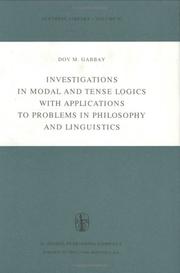
ISBN: 9027706565 9401014558 9401014531 9789027706560 Year: 1976 Volume: 92 Publisher: Dordrecht Reidel
Abstract | Keywords | Export | Availability | Bookmark
 Loading...
Loading...Choose an application
- Reference Manager
- EndNote
- RefWorks (Direct export to RefWorks)
Linguistics --- Mathematical logic --- Modality (Logic) --- Semantics (Philosophy) --- Grammar, Comparative and general --- Intension (Philosophy) --- Logical semantics --- Semantics (Logic) --- Semeiotics --- Significs --- Syntactics --- Unified science --- Language and languages --- Logic, Symbolic and mathematical --- Logical positivism --- Meaning (Psychology) --- Philosophy, Modern --- Semiotics --- Signs and symbols --- Symbolism --- Analysis (Philosophy) --- Definition (Philosophy) --- Modal logic --- Logic --- Nonclassical mathematical logic --- Bisimulation --- Comparative grammar --- Grammar --- Grammar, Philosophical --- Grammar, Universal --- Philosophical grammar --- Philology --- Grammar, Comparative --- Grammar, Comparative and general. --- Modality (Logic). --- Semantics (Philosophy).
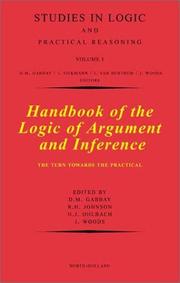
ISBN: 9780444506504 0444506500 9786611781415 128178141X 0080532918 9780080532912 6611781412 Year: 2002 Volume: v. 147 Publisher: Amsterdam Boston North Holland/Elsevier
Abstract | Keywords | Export | Availability | Bookmark
 Loading...
Loading...Choose an application
- Reference Manager
- EndNote
- RefWorks (Direct export to RefWorks)
The Handbook of the Logic of Argument and Inference is an authoritative reference work in a single volume, designed for the attention of senior undergraduates, graduate students and researchers in all the leading research areas concerned with the logic of practical argument and inference. After an introductory chapter, the role of standard logics is surveyed in two chapters. These chapters can serve as a mini-course for interested readers, in deductive and inductive logic, or as a refresher. Then follow two chapters of criticism; one the internal critique and the other the empirical critique. The first deals with objections to standard logics (as theories of argument and inference) arising from the research programme in philosophical logic. The second canvasses criticisms arising from work in cognitive and experimental psychology. The next five chapters deal with developments in dialogue logic, interrogative logic, informal logic, probability logic and artificial intelligence. The last chapter surveys formal approaches to practical reasoning and anticipates possible future developments. Taken as a whole the Handbook is a single-volume indication of the present state of the logic of argument and inference at its conceptual and theoretical best. Future editions will periodically incorporate significant new developments.
Logica. --- Argumentatie. --- Logic, Symbolic and mathematical. --- Logique symbolique et mathématique --- Logique mathématique --- Logic, Symbolic and mathematical --- 681.3*F41 --- Algebra of logic --- Logic, Universal --- Mathematical logic --- Symbolic and mathematical logic --- Symbolic logic --- Mathematics --- Algebra, Abstract --- Metamathematics --- Set theory --- Syllogism --- Mathematical logic: computability theory; computational logic; lambda calculus; logic programming; mechanical theorem proving; model theory; proof theory;recursive function theory--See also {681.3*F11}; {681.3*I22}; {681.3*I23} --- 681.3*F41 Mathematical logic: computability theory; computational logic; lambda calculus; logic programming; mechanical theorem proving; model theory; proof theory;recursive function theory--See also {681.3*F11}; {681.3*I22}; {681.3*I23}
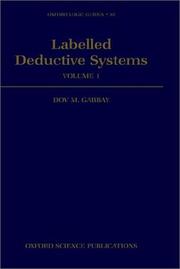
ISBN: 0198538332 9780198538332 Year: 1996 Volume: 33 Publisher: Oxford : Clarendon press,
Abstract | Keywords | Export | Availability | Bookmark
 Loading...
Loading...Choose an application
- Reference Manager
- EndNote
- RefWorks (Direct export to RefWorks)
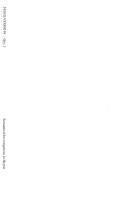
ISBN: 9027712026 9048183626 9401729778 9789027712028 Year: 1981 Volume: 148 Publisher: Dordrecht Reidel
Abstract | Keywords | Export | Availability | Bookmark
 Loading...
Loading...Choose an application
- Reference Manager
- EndNote
- RefWorks (Direct export to RefWorks)
Intuitionistic mathematics --- Heyting, A --- Constructive mathematics --- Mathematics --- Heyting, A. --- Intuitionistic mathematics. --- Heyting, Arend, --- Heyting, A - (Arend), - 1898 --- -Intuitionistic mathematics --- -Intuitionistic mathematics.
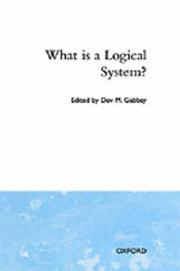
ISBN: 0198538596 9780198538592 Year: 1994 Publisher: Oxford : Clarendon Press,
Abstract | Keywords | Export | Availability | Bookmark
 Loading...
Loading...Choose an application
- Reference Manager
- EndNote
- RefWorks (Direct export to RefWorks)
Logic, Symbolic and mathematical --- Computer science --- Informatics --- Science --- Algebra of logic --- Logic, Universal --- Mathematical logic --- Symbolic and mathematical logic --- Symbolic logic --- Mathematics --- Algebra, Abstract --- Metamathematics --- Set theory --- Syllogism --- Computer science. --- Logic, Symbolic and mathematical. --- Logique symbolique et mathématique. --- Informatique. --- Logik. --- Mathematische Logik. --- Aufsatzsammlung. --- Logica. --- Systeemtheorie. --- Logica matematica. --- Logique.
Book
ISSN: 16112482 ISBN: 3642413889 3642413897 Year: 2013 Publisher: Heidelberg [Germany] : Springer,
Abstract | Keywords | Export | Availability | Bookmark
 Loading...
Loading...Choose an application
- Reference Manager
- EndNote
- RefWorks (Direct export to RefWorks)
This text offers an extension to the traditional Kripke semantics for non-classical logics by adding the notion of reactivity. Reactive Kripke models change their accessibility relation as we progress in the evaluation process of formulas in the model. This feature makes the reactive Kripke semantics strictly stronger and more applicable than the traditional one. Here we investigate the properties and axiomatisations of this new and most effective semantics, and we offer a wide landscape of applications of the idea of reactivity. Applied topics include reactive automata, reactive grammars, reactive products, reactive deontic logic and reactive preferential structures. Reactive Kripke semantics is the next step in the evolution of possible world semantics for non-classical logics, and this book, written by one of the leading authorities in the field, is essential reading for graduate students and researchers in applied logic, and it offers many research opportunities for PhD students.
Mathematics --- Physical Sciences & Mathematics --- Mathematical Theory --- Artificial intelligence. --- Computer science. --- Logic, Symbolic and mathematical. --- Logic. --- Argumentation --- Deduction (Logic) --- Deductive logic --- Dialectic (Logic) --- Logic, Deductive --- Algebra of logic --- Logic, Universal --- Mathematical logic --- Symbolic and mathematical logic --- Symbolic logic --- Informatics --- AI (Artificial intelligence) --- Artificial thinking --- Electronic brains --- Intellectronics --- Intelligence, Artificial --- Intelligent machines --- Machine intelligence --- Thinking, Artificial --- Mathematical logic. --- Computer Science. --- Mathematical Logic and Formal Languages. --- Artificial Intelligence (incl. Robotics). --- Mathematical Logic and Foundations. --- Algebra, Abstract --- Metamathematics --- Set theory --- Syllogism --- Intellect --- Philosophy --- Psychology --- Science --- Reasoning --- Thought and thinking --- Bionics --- Cognitive science --- Digital computer simulation --- Electronic data processing --- Logic machines --- Machine theory --- Self-organizing systems --- Simulation methods --- Fifth generation computers --- Neural computers --- Methodology --- Artificial Intelligence.
Book
ISBN: 904819587X 9786612995682 1282995685 9048195888 Year: 2010 Publisher: Dordrecht : Springer,
Abstract | Keywords | Export | Availability | Bookmark
 Loading...
Loading...Choose an application
- Reference Manager
- EndNote
- RefWorks (Direct export to RefWorks)
Legal theory, political sciences, sociology, philosophy, logic, artificial intelligence: there are many approaches to legal argumentation. Each of them provides specific insights into highly complex phenomena. Different disciplines, but also different traditions in disciplines (e.g. analytical and continental traditions in philosophy) find here a rare occasion to meet. The present book contains contributions, both historical and thematic, from leading researchers in several of the most important approaches to legal rationality. One of the main issues is the relation between logic and law: the way logic is actually used in law, but also the way logic can make law explicit. An outstanding group of philosophers, logicians and jurists try to meet this issue. The book is more than a collection of papers. However different their respective conceptual tools may be, the authors share a common conception: legal argumentation is a specific argumentation context.
Argumentation. --- Language and logic -- Congresses. --- Law -- Methodology -- Congresses. --- Logic -- Congresses. --- Law --- Philosophy & Religion --- Law, Politics & Government --- Law, General & Comparative --- Philosophy --- Methodology --- Sociological jurisprudence. --- Rationalism. --- Philosophy. --- Law. --- Political science. --- Logic. --- Artificial intelligence. --- Theories of Law, Philosophy of Law, Legal History. --- History of Philosophy. --- Political Science. --- Artificial Intelligence (incl. Robotics). --- Jurisprudence --- Knowledge, Theory of --- Religion --- Belief and doubt --- Deism --- Free thought --- Realism --- Law and society --- Society and law --- Sociology of law --- Sociology --- Law and the social sciences --- Philosophy (General). --- Artificial Intelligence. --- AI (Artificial intelligence) --- Artificial thinking --- Electronic brains --- Intellectronics --- Intelligence, Artificial --- Intelligent machines --- Machine intelligence --- Thinking, Artificial --- Bionics --- Cognitive science --- Digital computer simulation --- Electronic data processing --- Logic machines --- Machine theory --- Self-organizing systems --- Simulation methods --- Fifth generation computers --- Neural computers --- Administration --- Civil government --- Commonwealth, The --- Government --- Political theory --- Political thought --- Politics --- Science, Political --- Social sciences --- State, The --- Argumentation --- Deduction (Logic) --- Deductive logic --- Dialectic (Logic) --- Logic, Deductive --- Intellect --- Psychology --- Science --- Reasoning --- Thought and thinking --- Law—Philosophy. --- Mental philosophy --- Humanities --- Acts, Legislative --- Enactments, Legislative --- Laws (Statutes) --- Legislative acts --- Legislative enactments --- Legislation --- History. --- Legal history --- History and criticism
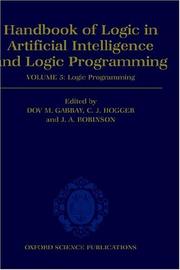
ISBN: 0198537468 9780198537465 Year: 1994 Publisher: Oxford Clarendon
Abstract | Keywords | Export | Availability | Bookmark
 Loading...
Loading...Choose an application
- Reference Manager
- EndNote
- RefWorks (Direct export to RefWorks)
Logic programming. --- Artificial intelligence --- Logic, Symbolic and mathematical. --- Deduction and theorem proving: answer/reason extraction; reasoning; resolution; metatheory; mathematical induction; logic programming (Artificial intelligence) --- 681.3*I23 Deduction and theorem proving: answer/reason extraction; reasoning; resolution; metatheory; mathematical induction; logic programming (Artificial intelligence) --- 681.3*I2 --- 681.3*I23 --- 681.3*I2 Artificial intelligence. AI --- Artificial intelligence. AI

ISBN: 128178141X 9786611781415 0080532918 0444506500 Year: 2002 Publisher: Amsterdam ; Boston : North Holland/Elsevier,
Abstract | Keywords | Export | Availability | Bookmark
 Loading...
Loading...Choose an application
- Reference Manager
- EndNote
- RefWorks (Direct export to RefWorks)
The Handbook of the Logic of Argument and Inference is an authoritative reference work in a single volume, designed for the attention of senior undergraduates, graduate students and researchers in all the leading research areas concerned with the logic of practical argument and inference. After an introductory chapter, the role of standard logics is surveyed in two chapters. These chapters can serve as a mini-course for interested readers, in deductive and inductive logic, or as a refresher. Then follow two chapters of criticism; one the internal critique and the other the emp
Logic, Symbolic and mathematical. --- Mathematics. --- Math --- Science --- Algebra of logic --- Logic, Universal --- Mathematical logic --- Symbolic and mathematical logic --- Symbolic logic --- Mathematics --- Algebra, Abstract --- Metamathematics --- Set theory --- Syllogism
| Listing 1 - 10 of 127 | << page >> |
Sort by
|

 Search
Search Feedback
Feedback About UniCat
About UniCat  Help
Help News
News